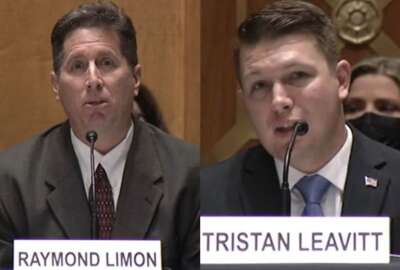
Now that it has a quorum, a progress report from the Merit Systems Protection Board
After several years of vacancy, the Merit Systems Protection Board has its full complement of three members,
Best listening experience is on Chrome, Firefox or Safari. Subscribe to Federal Drive’s daily audio interviews on Apple Podcasts or PodcastOne.
After several years of vacancy, the Merit Systems Protection Board has its full complement of three members, but only since June 1. Members after their Senate confirmations faced a big backlog of 1000s of appeals to decisions that had been made by administrative law judges. What’s that been like? MSPB member Tristan Levitt joined the Federal Drive with Tom Temin.
Interview transcript:
Tom Temin: And I think the most interesting fact of your newly established-reestablished career with the MSPB as a member is that you’re working remotely. How does that happen?
Tristan Leavitt: Well, it’s something that my wife and I had talked about for some time. She’s from Charleston, West Virginia, and we go out there all the time. So when the board didn’t have a quorum, one of the things that the staff really pushed was developing a way for board members to review and vote cases remotely. And so first I thought, “they’re not going to need that. No one goes through this whole crazy process who doesn’t want to come into the office.” But once we tested the remote voting app, and I thought,” Wow, you really could do this from anywhere.” So I come in as needed. It’s been fantastic.
Tom Temin: Given the fact that there are three members, there’s no chance that you would miss the fact that five ballots came in. It’s not like a state election for governor. There’s only three of you. So it’s easy to make sure that the vote is valid.
Tristan Leavitt: Yeah, absolutely. There’s a fantastic electronic app that, again, was pioneered by our staff. And it really makes it so easy. Before, it really was the case that every case had a whole paper file that got moved around. And now it all just moves seamlessly, electronically,
Tom Temin: But a process question here, you all read the case, you read the background, you review what the ALJ decided, and why before voting on either to uphold with the ALJ found or to reverse it in favor of whoever lost? Do you discuss it among yourselves first?
Tristan Leavitt: We don’t. In fact, because of the sunshine in government act, in order to discuss between the board members, you have to actually give public notice of a meeting. And so it’s long been the case at MSPB, that the board members will just consult with their own staff, but then they just cast their votes. And if there’s back and forth that needs to happen, it happens through their chief counsels or just through written comments.
Tom Temin: So it’s very formalized and process-oriented.
Tristan Leavitt: It is absolutely,
Tom Temin: I had this vision of the members sitting around stubbing out cigarettes and saying,” Well, wait a minute, he said in case ABC, paragraph five.” “Oh, yeah, I missed that. Well, maybe you’re right.” That type of discussion doesn’t happen?
Tristan Leavitt: It hasn’t. So far, there’s been some talk. Kathy Harris, the new incoming chair, and had talked about maybe doing more of those meetings. And we may yet it’s a little bit tricky, because the cases are so so you know, legally specific, right? So the case precedent, the other things that we rely on, don’t necessarily lend themselves to a big back and forth conversation, you’re really paying a lot of attention to the detail. And that happens easiest with a written product right in front of you.
Tom Temin: And refresh for us the number of new cases that come before the ALJs and then on to the board each year, on a normal year.
Tristan Leavitt: A really technical distinction that we actually have administrative judges mostly, which are slightly different from administrative law judges,
Tom Temin: I mixed that up with agencies over and over again.
Tristan Leavitt: Not a big deal. So we do use a couple of contract ALJs, but most of them are administrative judges, and they get about 5000 cases a year. And they process that same number. And that work all happened while the board was without a quorum. So an immense number of cases still came out of the board. People could appeal those directly to federal court if they wanted, but those that chose to file what they call a petition for review before the board, those come that we had gotten up to the number of 3,643, that were the inventory awaiting board decision. Most of those already had draft decisions, which were penned by staff. So it’s really just a matter of all that work was happening at the agency without board members, every office was kind of firing on all cylinders, by and large. But now that we’re here, that’s the inventory that we had to go through.
Tom Temin: Right. So that would indicate then given an absence of a board at all, for several years, maybe 1000 of the 5000 a year get appealed to the board.
Tristan Leavitt: That’s right, the numbers in the last decade or so it’s been about 900 a year. And so that really comes to our goals. Now with the quorum restored, our goal is to decide 1000 cases a year, during the absence of quorum, the numbers dropped. So it was really down to about 600 a year. Again, variety of reasons people might say I’m not going to wait in that line, do other things. So at 600 a year that have been coming in, our goal is to decide 1000 cases in this next fiscal year. And we hope that’ll put us in a good place to increase from there as we tackle that backlog.
Tom Temin: And do you have a way of prioritizing getting through that backlog pile? Because some of them are routine. Occasionally there is a precedential case that gets mixed in what are those numbers like how many of them are precedential each year?
Tristan Leavitt: I don’t know, precisely, but it’s significantly lower that are precedential. So you know, maybe there’s an average of 10 a month or so. A much larger number, we’ve been deciding about 70 to 80 a month altogether in these past few months. So the cases that we looked at first and restoring the quorum, were really front-loaded with a lot of precedential decisions, some of which many cases relied on. So our pace was slower, frankly, at first because we were tackling some of those really thorny cases. But now that some of them are decided that really gives guidance with a whole host of other cases.
Tom Temin: You sort of unplugged the drain, you might say. We’re speaking with Tristan Leavitt. He’s a member of the Merit Systems Protection Board. All right, so let’s summarize then. There were 3600 backlog cases when the board started reconvening. Now, the three members were as of June 1, but there was a quorum back in March. So what is your pace of getting through just the backlog? And what is your expected completion date of that?
Tristan Leavitt: So so far, it’s been seven months, essentially, since Ray and I were first confirmed. We’ve decided 511 cases that’s 73 per month. But again, that number has picked up pace. So in September just ended here, we decided 96 cases altogether. And so my guess is that we will continue to increase that pace, I’m very confident we’ll hit this 1000 goal. I think it’s clear that beyond this first year, we’ll need to increase those goal numbers, right. So that’s two, three years, then. At minimum, and a really large variable is how many cases continue to come in, will it stay at the 600 it’s been without a quorum, or will go up to the 900 it was historically? That will make a big difference. But after this first year, we’ll have a really good base of data to draw from and saying, “Here’s what we really need to do, and here’s how we can project we’ll finish up this backlog.”
Tom Temin: Because I was reading about one case of a fired VA employee that went through the whole system. And he died between the time that the judge rendered the decision, and the board rendered its decision. And so win or lose, it’s sort of moot.
Tristan Leavitt: Which is very unfortunate. So you know, the old saying is justice delayed is justice denied. And that goes both ways. That goes for agencies also that rightfully took an action, and they’re waiting for someone to say, Well, you did the right thing here, for them to be vindicated. But a real goal of ours also is to identify cases where change of circumstances really would make mediation a better circumstance. And so a death isn’t necessarily one of those. But sometimes the laws change since it really tilts the balance to one party or the other. And so we’re actively looking out for those kinds of cases, we can say, why don’t you go back to mediation? Because otherwise, it will take time for us to decide some of those even remands. There are cases that are six, seven years old, and the legally correct thing to do would be to remand it for additional fact finding. That may not always make sense. You may say, let’s just go back and figure out if there’s a way to resolve this.
Tom Temin: Right. Speed is really an important component of the whole justice for federal employees system, you might say.
Tristan Leavitt: Absolutely.
Tom Temin: And are you able to detect if it’s detectable, any difference in the quality of types of cases that arose when there was not an MSPB?
Tristan Leavitt: I don’t know that I have seen anything in terms of that. There’s without question a factor when the board isn’t issuing guidance regularly. So an example we’ve pointed to often is the VA Accountability and Whistleblower Protection Act, a lot of AJs had been asked to make decisions there, frankly, the same decisions across our whole AJ courts, about 65 administrative judges without getting centralized guidance. So it’s a lot more helpful if early on a board issues a decision says we’re going to handle these this way, rather than just looking at one’s colleagues and saying, well, some are doing it this way. Some are doing it that way. That’s where centralized guidance from a board or even updating our regulations becomes really key. And we just couldn’t do that with the lack of a quorum.
Tom Temin: Right. So there is some making up for lost time other than the backlog. Just simply in the establishment of guidance for the judges to be able to use?
Tristan Leavitt: Absolutely, it makes a big difference.
Tom Temin: And the other function of MSPB that people don’t see as much as all of the research into different aspects of federal employment. Did that slow down? And will the research return? Or what’s the status of those different projects?
Tristan Leavitt: It absolutely will return. The statute that gives MSPB the authority or even the mandate to conduct those studies was understood to require a quorum. So during that lack of board members, while I was there, as the general counsel, we issued some kind of slimmed down reports, kind of special studies, but the hard hitting data and conclusions, we felt needed to have a board to back it. But yesterday, actually, we released our new research agenda for the next four years. It is chock full of very interesting studies that we aim to undertake. And this is really a good time for it. These are some very, very timely areas.
Tom Temin: Yeah. What are the top three, say?
Tristan Leavitt: Top three in terms of the specific studies that would be a little bit harder to whittle down depending on who your audience is, you’ll have folks that are interested in different things there. I would encourage people to go on the website and look at the press release we issued yesterday, but the categories they’re in one is defending merit, building an effective workforce recruitment and hiring, pay and performance management, supervision and leadership and then focus on OPM. And each of those has some reports that I think will be immensely useful, that just haven’t been either researched before, or it’s been quite some time since there’s been data.
Tom Temin: Do you worry that the DEIA push by the administration now it’s coming down through OPM and agencies are waving this flag quite vigorously. Could that conflict with merit principles?
Tristan Leavitt: That’s a very interesting question. Probably, probably different folks than myself are the best ones to answer it.
Tom Temin: But it could result in cases that come to the Merit Systems Protection Board?
Tristan Leavitt: That’s quite possible. And of course, if that did then I’d have to adjudicate those. So that adds a further level of caution to what I say here. You know, I will say, you know, merit has been a standard that has been applied, obviously, since 1883. And whatever we do, as a government, I think it’s important to recognize that certainly, at least in terms of hiring, there’s been some interesting discussion as of late on fact that it hasn’t always been the same way on the backdoor, as they call it. But I think that’s the key criteria that everyone should be focusing on.
Tom Temin: And what’s your sense of any feedback or, I don’t know, appreciation coming from the Hill, I mean, the Senate took forever to get around to confirming people. And it seems arcane, you know, in the grand scheme of things that the Senate does, and the country worries about, but the Merit Systems Protection Board is kind of essential to Title Five, and the two point whatever million people that are under that system, you know, the numbers go up and down. So they said, glad you’re back?
Tristan Leavitt: I think confirming us was their way of saying glad to have a quorum there. We’ve felt very encouraged by the folks in the Senate and in the House that have helped us get to this point of restoring a quorum. Clearly, there are both members and staffers that really, really understand the significance of this. And there’s really robust debate going on in some related areas here right now. And so I think everybody recognizes this is significant. Two million employees is a really large number. And there are all sorts of debates that are maybe raging isn’t the right word, but you know, that are going on that I think, requires some really serious, thoughtful attention. And so MSPB is really kind of in the center of that, in some ways, both operationally, but in terms of the studies and other things. And so I think in terms of what we’ve heard from the Hill, they’re very hungry for feedback from us on what really will work and how can we best have a system that will both serve the American public well, and be efficient and effective.
Tom Temin: And there are only three of you. I mean, when there’s 100 senators or 435 House members, they can all argue and fight with each other. When there’s three of you, you all get along?
Tristan Leavitt: Absolutely, we really do. And that’s a real fantastic thing, even a blessing. I would say we I don’t know that it’s always, long in the past, that it’s always been that way. Certainly the prior set of board members set a really great example there. But we get along very well. We have a weekly lunch together. Again, we can’t talk cases during that time. But those relationships matter. They help to reinforce that each of us is coming at these things from a very good faith perspective. We may differ on views, but we want to get it right.
Tom Temin: And I think of the Merit Systems Protection Board is somehow more isolated from politics than say the Federal Labor Relations Authority. You know, the NLRB for the larger workforce of the United States, aside from the federal workforce, those are highly political appointees. FLRA, often not always, as they are to the NLRB. And so labor policy views on our labor unions good or bad, this kind of thing can come into those types of decisions. I see the MSPB is looking strictly at Title Five law, and therefore, an easier and more objective north star?
Tristan Leavitt: Yeah, I think that’s very accurate. And that makes for an easier job for us.
Tom Temin: Tristan Levitt is a member of the Merit Systems Protection Board.
Copyright © 2024 Federal News Network. All rights reserved. This website is not intended for users located within the European Economic Area.
Tom Temin is host of the Federal Drive and has been providing insight on federal technology and management issues for more than 30 years.
Follow @tteminWFED





